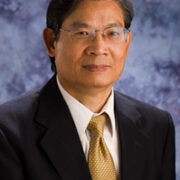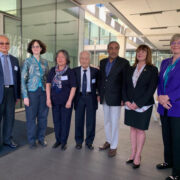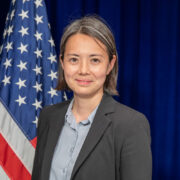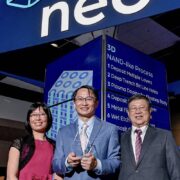史丹佛「台灣科學及科技中心」揭幕 台美科研開新頁
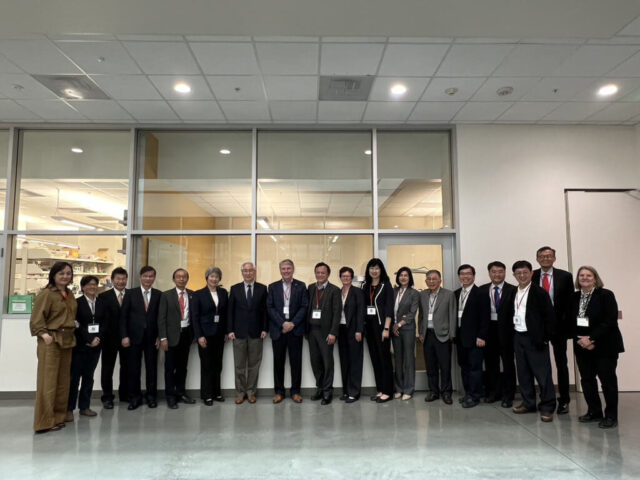
史丹佛「台灣科學及科技中心」2日正式對外揭幕,國科會主委吳政忠(左7)率團出席,史丹佛大學、加大柏克萊分校,以及多位產業界菁英親臨開幕研討會,並於中心辦公室外合影。(駐舊金山科技組組長孫珍理提供)中央社記者張欣瑜舊金山傳真 112年6月3日
(中央社記者張欣瑜舊金山2日專電)國科會主導、設於史丹佛大學的「台灣科學及科技中心」今天揭幕並舉行國際研討會,國科會主委吳政忠率團與會,史丹佛大學校長泰西耶拉文尼出席致詞,為台美科研合作開啟新頁。
國科會今年1月啟動「台美科研合作平台」計畫,整合跨部會資源,形塑台灣對外一致的科技實力形象,並優先選擇加州史丹佛大學為深度合作對象,於校內設立「台灣科學及科技中心」(Taiwan Science & Technology Hub)。
位於史丹佛工學院之下的「台灣科學及科技中心」,辦公室門口印有Taiwan Science & Technology Hub的英文字樣和圖案標誌,今日中心正式對外揭幕並舉辦國際研討會,史丹佛大學校長泰西耶拉文尼(Marc Tessier-Lavigne)與工學院院長韋頓 (Jennifer Widom)親自出席致詞。
泰西耶拉文尼表示,全球此刻面臨永續能源、地緣政治、生物科技、人工智慧等重大變化,台灣在史丹佛大學內設立「實體中心」,作為鏈結並整合台灣與灣區科研資源的橋梁,這項合作對解決當前挑戰至關重要且振奮人心。
韋頓指出,台灣與史丹佛大學工學院淵源相當深厚,台積電創辦人張忠謀1964年獲電機工程博士學位,此外,輝達(Nvidia)執行長黃仁勳、雅虎(Yahoo)創辦人楊致遠皆畢業於工學院,他們對世界科技發展影響深遠。
韋頓說,未來「台灣科學及科技中心」將讓這份傑出人才名單延續下去。
史丹佛大學外,加大柏克萊分校也有多位重量級人士參與研討會,工學院、化學院、自然資源學院、公衛學院共4位院長出席,就半導體、減碳,以及數位醫療發表專題演說,展現學術界對台灣科技和人才的高度重視。
4位院長當中,工學院院長劉金智潔(Tsu-Jae King Liu)的父母來自台灣,公衛學院院長呂淳祺5歲自台灣移民美國,兩人為國際學術界翹楚。
國科會主委吳政忠率團參與開幕研討會,他致詞感謝史丹佛大學與加大柏克萊分校為國際及台灣孕育眾多優秀科技人才,例如台積電創辦人張忠謀和董事長劉德音就分別出自兩所學府,而後為台灣半導體和科技發展做出貢獻。
吳政忠說,COVID-19(2019冠狀病毒疾病)疫情期間,全球晶片短缺凸顯台灣在半導體供應鏈上不可或缺的角色,台灣致力確保國際夥伴在關鍵供應鏈上的彈性和穩定;台美在晶片製造和設計的合作,能強化全球經濟安全,尤其在生成式AI爆炸發展之際。
今天的國際研討會吸引近500人參加,比原先預期規模更為盛大,除學術界,亦有多位政界、科技界和新創圈人士出席。(編輯:張芷瑄)1120603
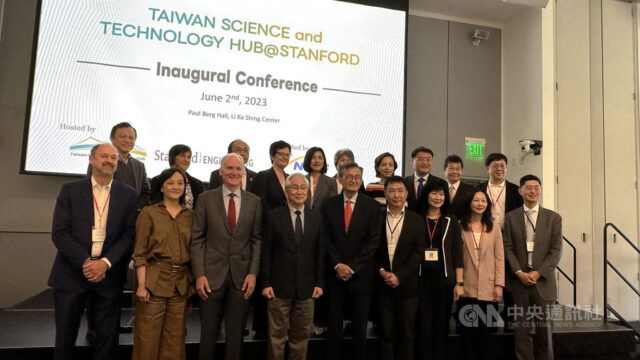
史丹佛「台灣科學及科技中心」2日以國際研討會形式揭幕,國科會主委吳政忠(前排左4)率團出席,史丹佛大學校長泰西耶拉文尼(前排左3)親自到場。中央社記者張欣瑜舊金山攝 112年6月3日
Taiwan Science & Technology Hub opens at Stanford University
San Francisco, June 2 (CNA) Under the initiative of Taiwan’s National Science and Technology Council (NSTC), the Taiwan Science amd Technology Hub, located at Stanford University, opened Friday.
The NSTC launched a program in January to build a Taiwan-U.S. technology research platform by integrating inter-ministerial resources in the Cabinet to strengthen the country’s technology capabilities and selecting Stanford University as a partner for cooperation in preparation for the opening of the Taiwan Science and Technology Hub.
Addressing the opening ceremony, Wu Tsung-tsong (吳政忠), head of the NSTC, said as the COVID-19 pandemic exacerbated a global shortage in semiconductors, Taiwan played a critical role in stabilizing the global IC supply chain.
Wu said cooperation in semiconductor manufacturing and design between Taiwan and the U.S. was expected to enhance economic security worldwide, in particular in the current booming generative artificial intelligence era.
Meanwhile, Stanford University President Marc Tessier-Lavigne said he expected the hub to serve as a bridge between Taiwan and the San Francisco Bay Area in technology resource integration.
Jennifer Widom, dean of the School of Engineering at Stanford, said Morris Chang (張忠謀), founder of Taiwan Semiconductor Manufacturing Co. (TSMC), received a Ph.D. degree in electrical engineering from Stanford in 1964, and Nvidia Corp. CEO Jensen Huang (黃仁勳) and Yahoo Founder Jerry Yang (楊致遠), both of who were born in Taiwan, also graduated from Stanford.
Widom added that the Taiwan Science and Technology Hub would allow such a talent list to grow.
On the opening day, the hub also held an inaugural technology conference with several heavyweights from the University of California, Berkeley, attending and delivering keynote speeches on semiconductors, carbon emission reductions and digital medical care.
Among these UC Berkeley scholars, Tsu-Jae King Liu (劉金智潔), dean of the College of Engineering, was born to parents who came from Taiwan, and Michael Lu (呂淳祺), dean of School of Public Health, migrated from Taiwan to the United States when he was 5 years old.
Wu expressed his gratitude to Stanford and UC Berkeley for their efforts in cultivating tech talent for the world and Taiwan.
According to Wu, while Chang graduated from Stanford, TSMC Chairman Mark Liu received his doctorate in electrical engineering and computer science from UC Berkeley.
Wu said both Chang and Liu had made tremendous contributions to Taiwan’s semiconductor technology.
(By Chang Hsin-yu and Frances Huang)
Enditem/ASG
Source from:
Posted on 06/28/2023

